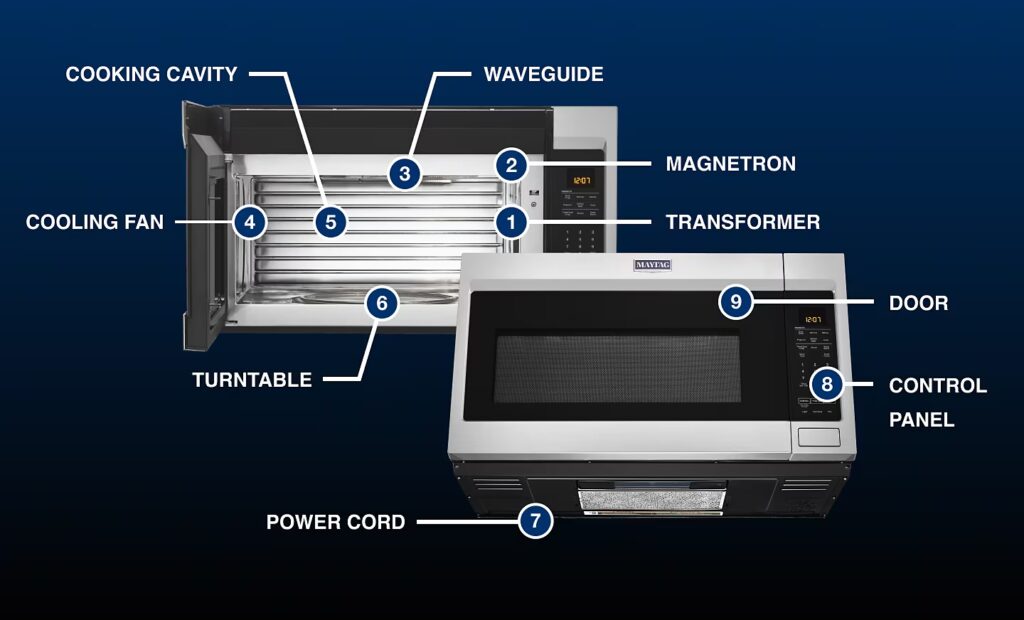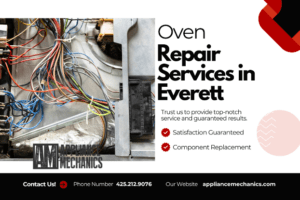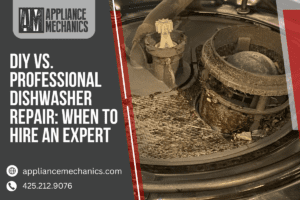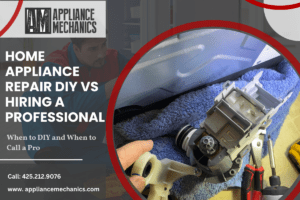
Maintenance Advice from Appliance Mechanics
Microwave ovens are an indispensable part of modern kitchens in Snohomish County. However, residents often need help with microwave ovens, such as inconsistent heating or disruptive noises. Local appliance mechanics have observed that most problems stem from inadequate maintenance or misuse. To ensure the longevity of these devices and avoid costly repairs, it is essential to understand the fundamentals of proper care. Routine maintenance can extend the appliance’s lifespan, improve its efficiency, and ensure its safety. By following expert advice, residents can avoid the inconvenience of premature breakdowns and keep their microwave ovens running smoothly.
Understanding Your Microwave: Basic Components and Their Functions

- High Voltage Transformer: Converts household electricity to higher voltage for the magnetron.
- Magnetron: Generates microwave radiation used to cook food.
- Waveguide: Directs microwaves from the magnetron into the cooking chamber.
- Cooling Fan: Prevents overheating by dissipating heat from the magnetron and electronics.
- Cooking Cavity: Encloses food and reflects microwaves throughout.
- Turntable: Rotates food for even cooking.
- Power Cord: Connects the microwave to an electrical outlet.
- Control Panel: Allows users to set cooking time and power levels.
Door: Seals the cooking chamber to prevent microwave leakage.
Issue #1: Microwave Not Heating - Diagnosing the Cause
When a microwave fails to heat, technicians first check for common culprits:
- Door Switch Issues: A malfunctioning door switch can prevent microwaves from heating, as safety mechanisms halt operation if the door isn’t sealed.
- Magnetron Failure: The magnetron generates the microwaves; if it burns out, it typically requires professional replacement.
- High Voltage Diode or Capacitor Problems: Diodes convert AC to DC voltage, while capacitors store electricity. Faults here disrupt power flow to the magnetron.
- Power Supply Issues: Inadequate voltage from power outlets can impair microwave performance.
- Control Board Problems: The central control board regulates the microwave functions. Sometimes, a reset is necessary; other times, a repair or replacement.
Technicians employ multimeters for electrical testing and special tools to effectively diagnose and fix these components.
Issue #2: Microwave Turntable Won't Spin – Causes and Solutions
The microwave turntable is essential for even cooking. When it fails to spin, causes could include:
- Roller guide issues: Dirt or food particles can obstruct the rollers. Cleaning them may resolve the problem.
- Turntable motor failure: Motors can burn out or fail electrically. Replacing the motor is the typical solution.
- Coupler breakdown: This connects the motor to the turntable. If damaged, it needs replacement.
- Control board problems: Sometimes, the issue is with the electrical control board, which may need repair or replacement.
Ensure power is disconnected before any troubleshooting. If uncertain, seeking professional assistance is advised to avoid safety risks or further damage.
Issue #3: Unusual Noises During Operation – Identifying the Culprits
Unusual noises from a microwave during operation can indicate a variety of issues. It is essential to address these sounds promptly to prevent further damage to the appliance. Common causes of strange noises include:
- Turntable Issues: If the glass plate or the roller guide is not seated properly, it can produce a grinding sound. Inspect and reposition these components.
- Cooling Fan Problems: Obstruction in the fan blades can cause a rattling noise. Cleaning the fan and surrounding area may resolve this.
- Magnetron Discomfort: A buzzing or humming noise may signal magnetron distress, possibly due to high voltage issues, requiring professional attention.
Drive Motor Failure: A failing drive motor that rotates the turntable can emit a grinding or humming noise, indicating it may need replacement.
Issue #4: Microwave Door Problems – Safety and Repair Strategies
Microwave doors must be sealed adequately to prevent microwave radiation from escaping. Common issues include damaged seals, dysfunctional latches, or misaligned hinges.
- Regular Inspection: Check for wear and tear on seals and ensure the door closes smoothly.
- Latch & Hinge Adjustments: If the door doesn’t latch properly, adjust or replace the latch mechanism. Misaligned doors may need hinge adjustments.
- Professional Consultation: Consult a technician for seal damage or if adjustments don’t resolve the issue. DIY repairs on microwave doors can be unsafe due to the risk of exposure to microwave radiation.
Always prioritize safety when repairing microwave doors; attempting repairs without proper expertise can be hazardous.
Issue #5: Control Panel Glitches: Navigating Electronic Issues
Electronic problems can often manifest as glitches in the microwave’s control panel. These issues may result in unresponsive buttons or erratic behavior. Appliance mechanics suggest the following steps to address electronic complications:
- Check the Power Source: Ensure the microwave is securely plugged in and receiving power. Sometimes, a simple power reset can resolve the glitch.
- Clean the Control Panel: Dirt or moisture can cause button malfunctions. Gently clean the panel with a soft, damp cloth.
- Inspect for Loose Connections: Over time, the vibration from the microwave can loosen wiring. Consult the manual and, if comfortable, check for any loose connections.
Seek Professional Help: If basic troubleshooting doesn’t fix the control panel issues, it’s wise to contact a trained technician to avoid further damage.
When to Call the Professionals: Recognizing Complex Microwave Issues
While homeowners can manage routine maintenance, specific microwave issues warrant professional attention. It is essential to call appliance mechanics when there are:
- Unusual Noises: Rattling or buzzing sounds may indicate a faulty motor or high voltage components.
- Electrical Problems: Sparks, tripped circuit breakers, or a non-responsive touch panel require expert diagnosis.
- Heating Inconsistencies: If the microwave is not heating properly, it could be due to a defective magnetron or other core components.
- Door Issues: A microwave door that doesn’t seal or close correctly poses a safety risk and can affect appliance efficiency.
- Error Codes: Displayed fault codes suggest internal issues necessitating technical repair knowledge.
In these instances, attempting repairs independently can be dangerous and may lead to further damage. Professionals have the necessary tools and expertise to resolve complex microwave problems safely.
Maintaining Your Microwave: Routine Care and Prevention Tips
- Clean Regularly: Wipe the interior with a damp cloth. Use mild detergent for stubborn stains; avoid abrasive cleaners.
- Turntable Maintenance: Remove and wash the glass turntable periodically with dish soap.
- Door Seals: Inspect the door seals for food particles and clean them to ensure proper closure.
- No Metal or Unapproved Containers: Avoid putting metal objects or non-microwave-safe materials inside to prevent damage and fire hazards.
- Adequate Ventilation: Ensure the microwave vents are not blocked to avoid overheating.
- Avoid Slamming the Door: Gentle closure prevents damage to the latching mechanism.
- Power Surges: A surge protector safeguards the microwave’s electronic components.
Use Pre-Set Cooking Times: Overuse of high power levels can wear out the microwave quickly; utilize sensor functions and presets.
Getting the Most Out of Your Microwave With Proper Care and Repair
Taking care of your microwave isn’t just a good idea – getting the most out of your appliance is essential. Following the manufacturer’s guidelines for regular cleaning and maintenance is a must. If something goes wrong, don’t wait – address the issue as soon as possible with the help of a qualified technician. Investing in high-quality replacement parts can drastically improve your microwave’s performance. Plus, scheduling periodic professional inspections can catch minor issues before they become big problems. By putting in a little effort to keep your microwave in top shape, you’ll enjoy an appliance that’s efficient, durable, and always ready to use.
If you are experiencing any issues with your microwave oven, it is essential to address them promptly to avoid further damage and costly repairs. Contact our reliable and experienced Appliance Mechanics in Snohomish County for prompt and efficient service. We can diagnose and fix any issue with your microwave, ensuring its longevity and safety. Don’t hesitate to call today (425.212.9076) or text us( 425.470.6059) to schedule an appointment!



